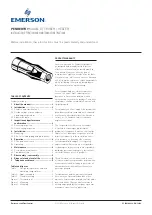
36
CAUTION:
THE POWER SUPPLY AND CONSOLE CONTAIN HIGH VOLTAGES (UP TO
250V DC) AND HIGH POWER CAPACITY, WITH A RISK OF PERSONAL INJURY AND
FIRE. SERVICE SHOULD BE PERFORMED BY COMPETENT QUALIFIED PERSONNEL, IN
ACCORDANCE WITH CORRECT ENGINEERING PRACTICE. IF IN ANY DOUBT, REFER
SERVICE TO THE RETAILER OR DISTRIBUTOR OF THE CONSOLE.
The external power supply contains a transformer with a number of secondary windings. These
secondaries are individually fused, rectified and smoothed. The fuse ratings and the power supply
rails to which they refer are marked on the chassis adjacent to each fuse.
CAUTION:
FOR CONTINUED PROTECTION AGAINST FIRE, REPLACE FUSES WITH
CORRECT TYPE AND RATING ONLY. DISCONNECT THE POWER SUPPLY FROM THE
MAINS BEFORE REPLACING ANY FUSE.
Fig. 1 is the view of the power supply connector from the outside, with the multicore cable
disconnected. The voltages are approximate values, when operated from 230V AC mains supplies.
Note that the 16V heater supply is floating, and cannot be measured with respect to ground.
The power supply contains bleed resistors to discharge the capacitors when the console is not
connected, but may take several minutes to discharge fully. The power supply should only be
operated off load by a qualified technician. Never disconnect or reconnect the multicore cable whilst
the power supply is connected to the mains or there is any voltage present on the power supply
outputs.
The regulator module for each bay is located underneath the valve PCB (PC334), in the rear section
of the console. To access the regulator module the top cover should be removed, and PC334 removed
by disconnecting the two IDC cables at the front of the board, removing the fixing screws and gently
lifting the board upwards. The PSU connector that links PC334 to the regulator module should be
disconnected before PC334 is finally lifted clear of the console frame.
The regulator module will now be accessible. It consists of PC357 mounted onto an aluminium
heatsink. Refer to the circuit diagram CD1357. An 8 way plug and socket (CN3) brings the
unregulated DC onto the module, where the various rails are immediately fused and then regulated.
Failure of any fuse or regulator will normally affect only its own bay, however the loss of one power
rail may cause noise injection onto the busses, so all routing switches in the failed bay must be turned
off (or the input modules removed), should the remainder of the console be operated in this
condition.
The voltage regulators may be individually adjusted by carefully measuring at the output connectors
(CN1 and CN2) or the test points marked on PC357. The voltages should be adjusted to:
HT:
+180V
+/-1V.
Phantom Power: +48.0V +/-0.1V.
V+:
+15.2V
+/-0.1V.
V-:
-15.2V
+/-0.1V.
H+:
+6.2V
+/-0.1V.
















































